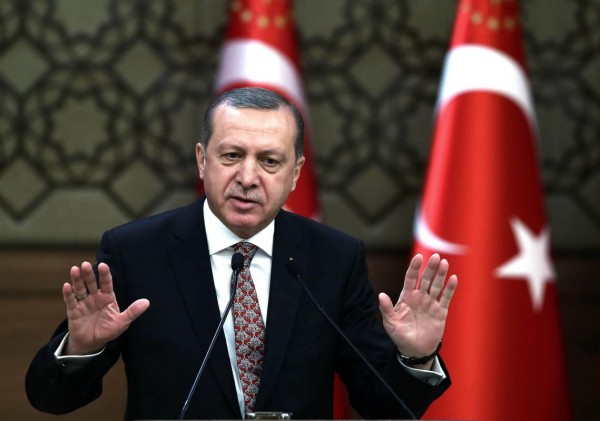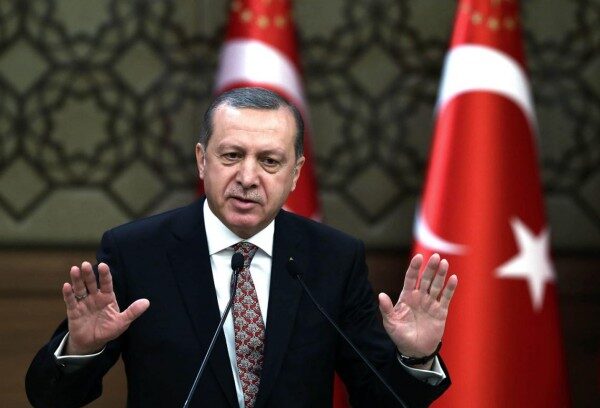
Turkey’s long-standing leader Recep Tayyip Erdogan has won a new five-year term after securing outright victory in the first round of a presidential poll.
Mr Erdogan got nearly 53% with almost all votes counted. His closest rival Muharrem Ince got 31%.
He will now assume sweeping new powers, won in a controversial referendum last year. The post of PM will be abolished.
The opposition is yet to officially concede but said it would continue its democratic fight “whatever the result”.
It had earlier cast doubt on results being broadcast by state media. Final results will be announced on Friday.
The polls were the most fiercely fought in many years.
Mr Erdogan has presided over a strong economy and built up a solid support base by investing in healthcare, education and infrastructure.
But the 64-year-old has also polarised opinion, cracking down on opponents and putting some 160,000 people in jail.
Mr Erdogan gave a triumphant victory speech from the balcony of his party’s headquarters in the capital Ankara at 03:00 (00:00 GMT), declaring: “The winner of this election is each and every individual among my 81 million citizens.”
Congratulations have come in from Islamic leaders including Iranian President Hassan Rouhani. Russian President Vladimir Putin talked of Mr Erdogan’s “great political authority and mass support”.
Mr Ince, from the Republican People’s Party (CHP), has accused state-run news agency Anadolu of “manipulation” over its reporting of vote-share figures.
He will make a statement at 12:00 (09:00 GMT) on Monday.
There were another four candidates on the presidential ballot, all of whom fell below 10% of the vote.
What does the result mean?
President Erdogan will assume major new powers under Turkey’s new constitution. The changes were endorsed in a tight referendum last year by 51% of voters, and are due to come into force after the election.
They include:
- Directly appointing top public officials, including ministers and vice-presidents
- The power to intervene in the country’s legal system
- The power to impose a state of emergency
Some critics argue the enhanced role will place too much power in one person’s hands, and that Turkey’s new system lacks the checks and balances of other executive presidencies like France or the US.
Mr Erdogan maintains his increased authority will empower him to address Turkey’s economic woes and defeat Kurdish rebels in the country’s south-east.
In his victory speech, he said Turkey would act more firmly against terrorist groups, and would continue to “liberate Syrian lands” so refugees could return to their homes there.
Mr Erdogan was prime minister for 11 years before becoming president in 2014. Under the new constitution, he could stand for a third term when his second finishes in 2023, meaning he could potentially hold power until 2028.

‘Progressive values are still here’
By Mark Lowen, BBC Turkey correspondent
Despite 90% of the media being pro-government and largely shunning the opposition, the president’s posters and flags dwarfing any challenge on the streets, the election being held under a state of emergency curtailing protests, and critical journalists and academics being jailed or forced into exile, Mr Erdogan only got half of the country behind him.
“We are living through a fascist regime”, the opposition MP Selin Sayek Boke told the BBC. “But fascist regimes don’t usually win elections with 53%, they win with 90%. So this shows that progressive values are still here and can rise up.”
For now, though, this is Mr Erdogan’s time. With his sweeping new powers, scrapping the post of prime minister and able to choose ministers and most senior judges, he becomes Turkey’s most powerful leader since its founding father Ataturk.
He’ll now hope to lead the country at least until 2023, a hundred years since Ataturk’s creation. And a dejected opposition will have to pick itself up and wonder again if, and how, he can be beaten.

Who won seats in Turkey’s parliament?
Mr Erdogan said the governing alliance led by his AK Party (AKP) had secured a majority, in a separate vote for the 600-member chamber.
State news agency Anadolu said the AKP itself had 42% of the votes for parliament with 99% counted, giving it a projected 293 seats. Its partner, the MHP, had 11% and 50 seats.
The opposition CHP won only 23% (146 seats) despite Mr Ince’s popularity in the presidential vote, while its nationalist ally the Iyi (Good) party won 10% (44 seats).
BBC


Leave a Reply
You must be logged in to post a comment.